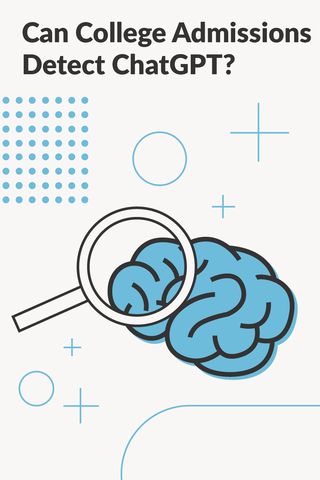
ChatGPT and similar AI-writing tools can quickly create a beautiful, well-written college essay based on a simple prompt. But while AI can write well, ethical questions and problems with accuracy could leave you wondering if you should use AI to help with college admissions.
Further, you may want to know if college admissions can tell when you’ve used tools like ChatGPT to write your essays and if they would hold it against you.
Here’s a closer look at AI writing detection and whether college admissions can detect when you’ve used ChatGPT.
The Rise of AI Writing Assistants
As most high school and college students know, new AI tools make writing papers and essays much easier than in the past. Just like a change from doing math by hand to using powerful but simple calculators, writing assistance can string together words on a seemingly endless range of topics in just a few moments.
It wasn’t very long ago that the company OpenAI released ChatGPT to the public. Google Bard and other large language models also entered the fray, allowing everyone with an internet connection to generate computer-aided essays.
Tech-savvy teachers and universities quickly found themselves scrambling to change how they teach and detect computer-written content. That extends from professors to admissions departments, aiming to maintain a system where students' or applicants' essays reflect their true capabilities.
The Fine Line Between Assistance and Academic Dishonesty
If you write a detailed prompt explaining what you need, and a computer does the rest, is it cheating? A growing number of businesses expect workers to understand how to use AI to speed up and improve their work. In fact, I used ChatGPT to help me put an outline together for this article. But I wrote every word myself.
Using ChatGPT for spelling and grammar checks, outlining, and coming up with ideas may be completely acceptable in some situations. However, AI models often create inaccurate writing, and as everything is based on existing information, you shouldn’t expect AI to generate any truly unique ideas.
Because everything AI creates at this point is derived from something else, some educators and businesses consider AI to be akin to plagiarism. And while anyone can understand why plagiarism is wrong, AI falls into a grey area where it’s difficult to say when you’re merely getting help versus cheating.
Current Technological Measures in College Admissions
“Your scientists were so preoccupied with whether or not they could, they didn't stop to think if they should." -Ian Malcolm, Jurassic Park
Just as the famous saying from the original Jurassic Park, sometimes, just because you can do something doesn’t make it right. In most cases, college admissions officers would clearly want something written completely by you rather than something spit out by a computer.
Teachers and administrators have quick and simple methods to detect AI-generated content. While they’re not completely accurate, AI-detection tools look for certain patterns and compare them to existing written content when assessing the origin of an essay or document.
As college admissions evolve, it’s likely that every essay will go through an AI detector to determine the likelihood it was written by a tool like ChatGPT. It would be a shame to lose out on attending your top choice school because you used AI for your essays. Even though you can use AI to polish your writing, it’s still best to completely write your college admissions application using your own brain, not a digital one.
Case Studies: Have There Been Incidents?
You can find plenty of stories about professors and teachers using AI detection tools when grading papers, but few universities and colleges have formal AI policies regarding admissions.
The University of Michigan Law School recently issued guidelines telling applicants to avoid using AI tools like ChatGPT. On the other side of the spectrum, the law school at Arizona State University says you can use AI, but only when you use the technology responsibly. Georgia Tech said you can use AI to brainstorm, refine, and edit but shouldn’t copy and paste an essay directly.
2023 is the first full academic year where universities have to grapple with AI-generated essays. If you decide to incorporate AI into your application process, follow the rules set by the college you’re hoping to attend and use AI responsibly to supplement your words, not create them completely.
Future of AI and College Admissions
There’s no precise answer for how to use AI the best way while maintaining ethics in your application process. But we can be sure that many schools have AI on their radar and are considering how new applications should be reviewed, including testing for essays created partially or completely by AI.
I’m a professional writer and use AI nearly daily as an assistant to speed up and improve my work. But I would never turn in a project where I blindly trusted AI to the task. Quality and accuracy are important, and I can’t trust AI to do my job as well as I do. Plus, AI is generic and bland, the opposite of what you (and college admissions officers) want to read.
The future of AI in college admissions will ebb and flow as schools learn how to detect AI even better. AI systems are also bound to improve dramatically. While nobody has a crystal ball, colleges and universities will likely frown on applicants using AI to express themselves in the most personal part of the application.
While you can use AI to write your essay, you probably shouldn’t, even if you won’t get caught. Using AI to help isn’t necessarily bad, but applicants are still best served writing their own college admissions essays.

Eric Rosenberg is a financial writer, speaker, and consultant based in Ventura, California. He holds an undergraduate finance degree from the University of Colorado and an MBA in finance from the University of Denver. After working as a bank manager and then nearly a decade in corporate finance and accounting, Eric left the corporate world for full-time online self-employment.
His work has been featured in online publications including Business Insider, Nerdwallet, Investopedia, The Balance, Huffington Post, and other financial publications. When away from the computer, he enjoys spending time with his wife and three children, traveling the world, and tinkering with technology. Connect with him and learn more at EricRosenberg.com.
Editor: Ashley Barnett Reviewed by: Robert Farrington
